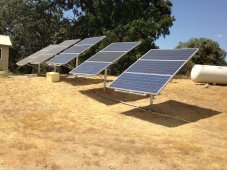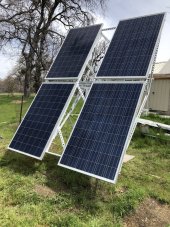LearningNewThings
New Member
- Joined
- May 18, 2022
- Messages
- 4
I am looking for advice on building a system focused on battery backup in the near term, and potentially augment with a few portable solar panels in the long term to deploy temporarily in the yard as needed. The goal is to get to 3-7days of backup power for critical things, including 2 fridges (maybe just 1 of them if the power consumption is too high), a freezer, a gas powered tankless water heater, modem/router, and some mobile device and laptop charging.
Proposed hardware:
-6 server rack rack batteries (probably eg4 LL or LifePower4)
-closed sever rack (need to keep kids out)
-an inverter (not sure which one, but I'd rather buy one than two, recommendations please)
-transfer switch (not sure which, is this function ever built into an inverter? what is a good automatic transfer switch?)
-what else am I missing? do I need an additional subpanel?
-permit? as far as I can tell no permit is required for just batteries?
The goal is for this to stay charged most the time and to kick on automatically if the power goes out and use the backup power on the critical switches. I had been thinking of a split phase inverter like the MPP solar LV6048 on the off chance that I upgrade and try to power an AC unit or something like that with solar panels, but do I really need 240V? On the other hand, if I deploy solar panels, my county (in Georgia) seems to suggest I would need to get the setup inspected, but would that apply for just temporary deployments? Not sure. If my inverter is not UL listed (LV6048 is not UL listed), could the inspection fail or is the UL usually only important if I want to feed power back to the grid (not interested in that)?
Does my setup sound reasonable? Is there a different inverter you would recommend? The MPP one is not in stock anyways. I see plenty of growatt in stock but wondering if there is a reason for that.
Also, any risks that I should be aware of? Does the bms in a server rack prevent the batteries from doing anything crazy like catching on fire? What is the risk of an inverter damaging any of my appliances?
Proposed hardware:
-6 server rack rack batteries (probably eg4 LL or LifePower4)
-closed sever rack (need to keep kids out)
-an inverter (not sure which one, but I'd rather buy one than two, recommendations please)
-transfer switch (not sure which, is this function ever built into an inverter? what is a good automatic transfer switch?)
-what else am I missing? do I need an additional subpanel?
-permit? as far as I can tell no permit is required for just batteries?
The goal is for this to stay charged most the time and to kick on automatically if the power goes out and use the backup power on the critical switches. I had been thinking of a split phase inverter like the MPP solar LV6048 on the off chance that I upgrade and try to power an AC unit or something like that with solar panels, but do I really need 240V? On the other hand, if I deploy solar panels, my county (in Georgia) seems to suggest I would need to get the setup inspected, but would that apply for just temporary deployments? Not sure. If my inverter is not UL listed (LV6048 is not UL listed), could the inspection fail or is the UL usually only important if I want to feed power back to the grid (not interested in that)?
Does my setup sound reasonable? Is there a different inverter you would recommend? The MPP one is not in stock anyways. I see plenty of growatt in stock but wondering if there is a reason for that.
Also, any risks that I should be aware of? Does the bms in a server rack prevent the batteries from doing anything crazy like catching on fire? What is the risk of an inverter damaging any of my appliances?




